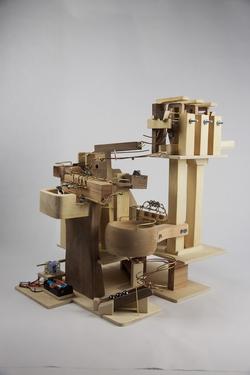Bachelor’s Program
Through challenging studio projects and more, the four-year BFA in Industrial Design helps you become aware of materials and gain an in-depth understanding of visual and 3D vocabulary.
Faculty emphasize the traditional values behind industrial design and current trends in the profession as you progress from creating developmental drawings to three-dimensional mockups and models, working drawings and prototypes that incorporate manufacturing considerations.
Curriculum
The program begins sophomore year with skill-based exposure to both traditional and state-of-the-art techniques for visualization. Through the manipulation of wood, metal, paper and plastic, you begin to understand the unique properties of these materials and the design possibilities inherent in them.
Junior year builds on the skills learned the first year by encouraging you to focus on projects dealing with technology as it applies to products, form and human factors, mechanics and movement, and more.
During senior year, you take advanced design studios, learn more about legal and business practices in the profession and undertake projects that emphasize innovation and the ability to refine formal design issues.
Learning outcomes
Graduates are prepared to:
• develop material ideas with facility, clarity and rigor.
• conceptualize and develop ideas imaginatively and accurately in three dimensions.
• effectively communicate their design intent to disparate audiences (including clients, users and fabricators).
• apply knowledge of user experience, human factors, applied ergonomics, contextual inquiry, user preference studies and usability assessments in the design development process.
• understand the contribution their work is making to the profession and the discipline.
• exercise collaborative skills for working across disciplines and in multidisciplinary fields.
Undergraduate student work

Hong Kyu Park BFA 2017

Isabella Sustina BFA 2019

Ken Chen BFA 2017

Daniel Woolhiser BFA 2018

Christina Strachoff BFA 2018

Quincy Kuang BFA 2019

Glory Dang BFA 2019

Karsten Goodwin BFA 2018

Quincy Kuang BFA 2019

Megan Lee BFA 2018

Hong Kyu Park BFA 2017

Isabella Sustina BFA 2019

Ken Chen BFA 2017

Daniel Woolhiser BFA 2018

Christina Strachoff BFA 2018

Quincy Kuang BFA 2019

Glory Dang BFA 2019

Karsten Goodwin BFA 2018

Quincy Kuang BFA 2019

Megan Lee BFA 2018

Hong Kyu Park BFA 2017

Isabella Sustina BFA 2019

Ken Chen BFA 2017

Daniel Woolhiser BFA 2018

Christina Strachoff BFA 2018

Quincy Kuang BFA 2019

Glory Dang BFA 2019

Karsten Goodwin BFA 2018

Quincy Kuang BFA 2019

Megan Lee BFA 2018
Inspiring community
Approximately 300 undergraduates and 30 graduate students work together in a six-floor former manufacturing facility renovated to suit the department's needs. In sharing studio, shop and gallery spaces, students readily exchange ideas and learn from each other. Faculty with a broad range of professional experience and expertise fully engage with students—both in class and through informal conversations in the studio.
Learning environment
ID majors often engage in collaborative work, both with students and faculty in other departments and with off-campus partners at MIT's Sloan School of Management, Brown University, NASA and Massachusetts General Hospital, among others. Wintersession internships and sponsored studio projects backed by such corporations as Samsung, Kimberly Clark, Progressive, Timberland and others provide market-based design opportunities.
In addition, ID students often work on sustainable projects for under-resourced communities in the US and countries such as Costa Rica and Argentina.
Application requirements
Common Application
You’ll begin and manage your RISD application process by completing the Common Application. There is a nonrefundable application fee
Fee waiver
We want to make sure that application fees do not pose a barrier for any student. If you meet certain qualifications, you can request a Common Application fee waiver in one of the following two ways:
- Navigate to the "Fee Waiver" portion on the Common Application and select the option that most fits your family circumstances. This will allow you to submit your application without entering credit card information.
- If your situation does not match any of the Common Application’s waiver criteria, email admissions@risd.edu and we’ll process the waiver manually.
To receive a SlideRoom fee waiver, please email admissions@risd.edu.
Academic transcripts
Applicants must provide official transcripts of all secondary academic work through the most recent grading period. Your counselor may submit your transcript through the Common Application, Parchment, email or mail.
If your academic credentials are not written in English, they must be translated into English by an approved translator prior to submission.
Tests and test-optional
Test-Optional, SAT and ACT
We offer all applicants (domestic and international) the option to apply without submitting results from the SAT or ACT. You may opt into this process by selecting “test-optional” under the "Testing" portion of your RISD Common Application.
For students who choose to submit test scores, we will superscore your results, looking at your highest outcome across multiple test dates.
RISD’s institution code number for the SAT is 3726; for ACT the code number is 003812.
Transfer credits
You can use some Advanced Placement (AP), A-Level classes and International Baccalaureate (IB) credits toward RISD liberal arts requirements. First-year students can transfer a maximum of nine credits from AP courses with a score of 4 or 5, A-Level classes with an earned grade of C or higher or Higher Level IB scores of 5, 6 or 7. We will not accept AP or IB credit from art or studio classes.
VIEW OUR FULL TRANSFER CREDIT POLICY
English language proficiency tests
All applicants who speak English as a second language, including US citizens, must submit results from any one of these three options:
- TOEFL (Test of English as a Foreign Language)
- IELTS (International English Language Testing System)
- Duolingo (an online English test).
Since English proficiency is a prerequisite for acceptance, applicants are required to meet a minimum score of at least 93 on the TOEFL, a 6.5 on the IELTS or a 115 on Duolingo.
Plan to take the TOEFL or IELTS well in advance of the application deadline since it may take three weeks for your scores to be sent to RISD by the test agency. It may take up to four days for us to receive Duolingo test results.
The language test requirement may be waived for applicants who have studied in an institution where English is the language of instruction. You must email the Admissions Office at admissions@risd.edu to explain your school history and determine if you are eligible for a waiver.
Portfolio and the RISD Assignment
Portfolio submission
Your portfolio should present 12–20 examples of your most recent work showcasing your thinking and making. Once you've started your RISD application in the Common Application, you will be directed to the online platform SlideRoom to upload your portfolio.
What to include
The work you select should reflect a full range of your ideas, curiosity, experimentation and experience in creating and making. This can include work in any medium, in finished or sketch form, and can be the result of an assigned project or a self-directed exploration.
We strongly recommend that you include some examples that involve drawing from direct observation (rather than from imagination, photograph or video). Since drawing is a fundamental tool for visual makers from initial concept to execution, it is valuable for reviewers to see examples of your experience with and approach to drawing.
While the majority of your portfolio should feature finished pieces, we suggest including some research or preparatory work in up to three—but no more than three—portfolio uploads/slides. This helps reviewers better understand how you develop your ideas.
Documentation
Finally, we strongly discourage including excessive visual elements and text descriptions in a single slide submission. These are difficult to view and are likely to exceed the allowed submission limit.
You can submit additional angles or detail shots of some works across multiple slide submissions, combined into one composite including no more than three images, or in a single video upload. Editing is an important part of curating your portfolio. You may need to devise creative solutions to best show your work within the limits of submission guidelines.
We recommend the following file formats: jpeg, png, gif, mp4 and mov. These formats are most compatible with SlideRoom. We discourage Google Drive and zipped files.
You may be interested in attending or watching the recording of one of our portfolio tips webinars for more advice on how to approach your RISD application portfolio.
The RISD Assignment is no longer part of the application
After extensive research and discussion, it has become evident that requiring the RISD Assignment functions as a barrier for applicants and is in direct conflict with RISD’s Social Equity and Inclusion action plan.
To provide more access and equity in our admissions process, we have removed the RISD Assignment as an application requirement. We will continue to prioritize the portfolio when evaluating the visual component of an applicant’s candidacy.
College essay
RISD requires the Common Application personal essay (up to 650 words). You will find the writing prompts in the Writing section of the Common Application.
While we encourage you to adhere to the rules of good writing, we look for applicants who are not afraid to take risks in their expression. Please don't hesitate to use a writing style or method that may be outside the mainstream as you express a distinctive personal position in your essay.
Letter(s) of recommendation
Letters of recommendation can be very helpful to your application. One letter is required, although you may submit as many as three. Recommendation letters should be written by teachers or other professionals who have firsthand knowledge of your art or academic achievements and can comment on your potential as a student.
Please use the Common Application to invite your recommendation writers to submit letters through that service. Letters may also be sent directly to our mailing address (see “Submitting your materials” below) or emailed to admissions@risd.edu.